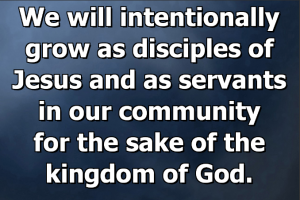Good fruit and bad fruit: you know the difference. What kind do you consume? What kind do you produce? What kind are you? Pay attention to the Sermon on the Mount as Pastor David preaches from its conclusion, Matthew 7:13-20.
Being Blessed for the Kingdom
The way of the kingdom of God runs counter to the way of the world. How does Jesus intend his followers to live? Listen in as Pastor David explores the first portion (Matthew 5:1-12) of the Sermon on the Mount (Matthew 5-7), which will be our focus all summer long.
Mission in the USA
Based on John 15:9-17, Pastor David argues that there is no such thing as a Christian nation. Instead, we are all missionaries wherever we find ourselves – for the sake of the kingdom of God!
What Good is This Gift?
“In God We Trust” – or do we? Once, Jesus sat in the temple and watched people put money in the offering plate. He praised the poor widow who gave her last two coins, rather than the rich who gave much more money. What good was her gift? Listen in to Pastor David’s message on Mark 12:41-44, the last in our series on tithing and stewardship.
Who Then Can Be Saved?
Two stories in Luke 18–19 illustrate how hard – yet how possible – it is for the rich to enter the kingdom of God. One character “gets it,” while the other walks away disappointed from Jesus. What does this have to do with our tithes and offerings (and other tangible acts of service)? Listen in to Pastor David’s message:
On Veterans, Armistice, and Peace
Three years ago, I wrote an article entitled “Thoughts on Veterans Day.” In it, I encouraged us to seek a “peaceful way of life” and to “pray for peace around the world.” But what a difference three years makes! When I wrote those words, the ongoing civil war in Syria was just beginning; the “Arab Spring” was less than a year old; ISIS did not exist; and Sandy Hook and Benghazi were just locations, not tragedies of violence. Osama bin Laden had been killed six months earlier, and American troops were still heavily engaged in Iraq and Afghanistan. in our own nation, Michael Brown and Trayvon Martin were still alive.
God, grant us peace in our time, so that three years from now we will have fewer reasons to be surprised at the human capacity to wage war and to act violently.
Today, Veterans Day, is a day when our cultural sensitivity is at its highest: the nation pauses at 11am, the eleventh hour of the eleventh day of the eleventh month, in honor and remembrance of all those men and women who have served in the armed forces of the United States. This is an expansion of the original Armistice Day, a celebration of the end of World War I – the “war to end all wars” – which ended at 11am on November 11, 1918. In the intervening ninety-six years since that date, we have seen many more wars, many more acts of violence, many more veterans being carried home in caskets or carrying PTSD home with themselves, many more pursuits of arms rather than pursuits of armistice.
God, grant us peace in our time, so that four years from now we can celebrate the 100th anniversary of the end of World War I with thankfulness that peace is defeating violence both at home and abroad.
Today, in my daily Bible reading, I read the four gospel accounts of the burial and resurrection of Jesus. For Christians, this event is the climax of human history. Everything changes because Jesus lived, taught, ministered, died, and rose again. We interpret our lives and world events through the lens of Christian faith. Our allegiance is first and foremost to the kingdom of God, which Jesus proclaimed throughout his ministry. Our hope is in the salvation of God, which Jesus brought about through his death and resurrection. Our peace is found in reconciliation with God, which Jesus graciously provided through no help of our own. Jesus is the True Veteran, the one who waged war against sin itself and was victorious, the one who achieved this victory not through aggression and violence and bombs and guns and survival tactics but through laying down his life of his own volition, the one who served not a nation or state but a kingdom, his kingdom, an unending kingdom, a kingdom of peace.
God, grant us peace in our time, so that ten, twenty, fifty years from now we will see that “the kingdom of the world has become the kingdom of our Lord and of his Christ” (Revelation 11:15 NIV).
Yes, Lord, bring your peace into this world, and bring it quickly.
In the final words of the Bible (Revelation 22:20-21 NIV),
He who testifies to these things says, “Yes, I am coming soon.” Amen. Come, Lord Jesus. The grace of the Lord Jesus be with God’s people. Amen.
Preparing for the Banquet, Part II
Ten young girls were invited to be bridesmaids in a wedding procession. All of them showed up, but only half were prepared. How does this parable of Jesus connect to our spiritual lives? Listen in to Pastor David’s sermon on Matthew 25:1-13.
Seeing the Goal
We began a new sermon series this week: what is our vision as a congregation? What drives us into God’s preferred future? And what does this have to do with how we communicate as a church family? Listen in to Pastor David’s sermon on Philippians 3:4b-14:
This is the vision statement which Pastor David references in the sermon:
Advent: What are you expecting?

Today, I’d like you to read Isaiah 9:1-7, even if you have read it many times in the past. As you read, think about what you expect out of the Christmas season. What are you anticipating? What do you think will happen in the next few weeks?
Isaiah wrote his prophecy several hundred years before Jesus’s birth in Bethlehem. Isaiah didn’t know when Jesus would be born, who his mother would be, how Jesus would live and die and live again, or any of those details. All he knew was that there were people in his time who were in distress and were being oppressed, and that eventually God would send a ruler who would make everything right for all time.
Did Jesus fulfill this prophecy written by Isaiah? That question leads to one of the most controversial questions in all the world: how do you understand Jesus of Nazareth? For those of us who understand the connection between Jesus and Isaiah 9:1-7, we can rejoice that our Savior has come, that the Prince of Peace has broken the bars of oppression, that the newborn child in Bethlehem grew up and now reigns over the kingdom of God for all time.
Sometimes I wonder if we take those statements for granted. Do we truly grasp the significance of Jesus fulfilling Isaiah’s prophecy? Are we able to identify with “walking in darkness” so that we can understand “seeing a great light”? Will we allow the Lord’s holy zeal to bring about peace, justice, and righteousness in our world?
Or will we allow Christmas to be a sentimental holiday reserved for seasonal decorations, gift exchanges, and sweet desserts?
Throughout this month (and beyond), consider the truth of our faith: that Jesus Christ, the Son of God born in Bethlehem over 2000 years ago, has fundamentally changed our world, our society, our relationships, and our personal experiences. His kingdom will endure forever and ever!
–Pastor David
Shrinking Church

It’s the week of Thanksgiving, and many of us are turning our attention to family matters and turkey feasts. Before the festivities begin, I’d like to share with you an article I found online recently. You can read the full article here; its title is “How to Shrink Your Church,” and it was written by a pastor named Tim Suttle. If you haven’t done so already, please read this brief article; it is well worth your time.
Christians seem always to be interested in growing: we want pews to be filled, classes to be well-attended, programs to blossom. I can’t lie – when I heard 150 strong voices fill our sanctuary with musical praise to God at our Community Thanksgiving Service the other day, I was thrilled and wondered what it would be like if we were to have that experience every Sunday. We are constantly concerned with our future, with the next generation of believers, with the hope for things to turn around.
What does success look like in the eyes of God? How do we know if we are doing the right things? Even Jesus told the parable of the talents, in which the two servants who doubled their resources were praised while the one who buried his in the ground was condemned. And with the bar set high (“go and make disciples of all nations,” Matthew 28:18-20), the ideal path of church success seems straightforward enough: we are successful if we grow in size, influence, energy, and so forth.
To be fair, we should be concerned with introducing people to Jesus, the one who died to forgive our sins, who gives us new life, and who walks with us through every experience. Adding people to the kingdom of God is always a priority.
Yet I believe Pastor Suttle’s core idea is also true, and I want to restate it in my own words here. Growing churches are exciting places to be, but any church – growing or otherwise – can fall under the spell of two false teachings: (1) “Feel good” Christianity, in which everything that happens makes us feel better about our lives as we have already chosen to live them, and (2) “Church growth” Christianity, in which we follow specific programs and procedures that are designed to grow the congregation, again to help us feel better about our situation.
In order to be effective and successful Christ-followers, we must remain absolutely faithful to the message of Jesus, the kingdom of God, and the scripture which points us to God. Church growth is not about fancy programs and entertainment. It is about calling ourselves and others into deep, intimate, life-changing relationship with Christ and into meaningful, sacrificial, humble service in our world.
We must pursue Christ unashamedly, which might not be too popular. After all, Jesus himself said we’d have to eat his flesh and drink his blood, and that line cost him a lot of followers. We must spend ourselves for the sake of the kingdom of God. If we find ourselves completely spent, then we are in the right position: God is the master of resurrection, and there can be no substitute for the new life he gives his people.
–Pastor David
